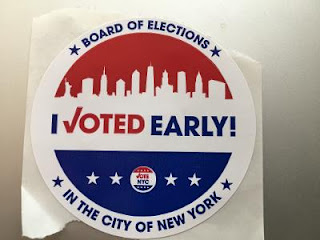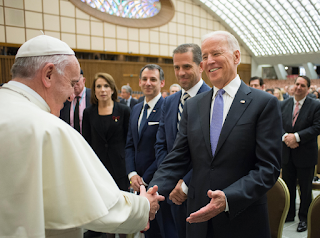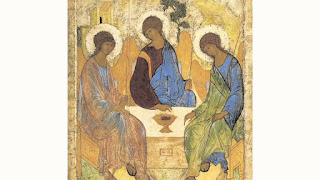My attitude toward « Early Voting » has evolved over the years. The romantic in me would like to celebrate everyone coming together on a single day to vote in a common civic ritual. For what it may be worth, I do still think the ritual aspect of voting and elections is important, which is why I would favor restoring Election Day as a holiday. That said, especially as I get older I cannot be insensitive to the practical challenges which voters face, whether from Republican voter-suppression efforts or from the ordinary challenges of life (like the vicissitudes of aging and physical disability). I myself have increasingly availed myself of « early voting » – both in Tennessee, where it is much easier, and here in New York, where it is (like most things in New York) less easy.
Reports suggest that early voting this year is high. In itself, of course, that tells us nothing. It does not automatically tell us that turnout this year will be high. Early voting after all, may be just a change in regular voters’ patterns (as it is in my case). More early votes may mean fewer election-day votes, with no noticeable overall change in turnout. That said, 53% percent of the voting-age population voted in the 2018 midterm, the highest midterm turnout in four decades. If reports are to be believed, intensity is high on both sides. There are reports that perhaps 10-20% of this year’s early voters did not vote in 2018. So perhaps we are headed for another high-turnout election. We will know soon enough.
At this point, election prognostication seems to be primarily about polls, which have become increasingly problematic for all sorts of methodological reasons, which may or may not be fixable. That, of course, is bad enough. Even worse, our obsession with polls highlights the media’s obsession with the « horserace » – and hardly at all encourages attention to what the results will be both for public policy and for basic governance. Some of those results could be quite calamitous.
The transformation of politics in the course of my lifetime has been overwhelming. The older political cleavage between « left » and « right, » regarding policy differences at that time about the New Deal and post-New Deal divisions about the role of government in guaranteeing greater material well-being, has long since given way to much deeper identitarian differences dividing society along moral and cultural cleavages and in a much more profound, destructive, and irreconcilable way. Misleadingly, our two American political parties have had the same names since the Republicans were founded in the 1850s. In my lifetime, however, the two parties have changed almost beyond recognition, their names alone remaining unchanged.
In addition, one side suffers from falsehood as its substitute for fact and an increasing comfort with anti-democratic language and behavior and even outright violence. It trades in demonization of anyone it can categorize as « other » and has a special history of demonizing women (e.g., Hillary Clinton, Nancy Pelosi). The other side suffers from factionalism and an addiction to hysterical, pseudo-moral panic, which encourages increasingly self-discrediting postures and politically indefensible positions. Given our tribalism and affective polarization, neither side seems to have any ambition or desire to persuade anyone outside its bubble.
Not that there are very many to persuade. On the one hand, the two tribes are increasingly demographically defined and affectively polarized, making old-fashioned swings from one party to another or traditional « ticket-splitting » quaintly obsolete. At the same time, the country appears so evenly divided that there just aren’t that many in-between voters (although there still may be many « undecideds, » who are in fact low-information voters or likely non-voters). So, more and more, each election becomes a turnout election, and each side has gotten good at turning out a lot of voters, many of whom might not even have voted before.
And that is where we are one week away from what may be one of the most consequential elections of our time.





